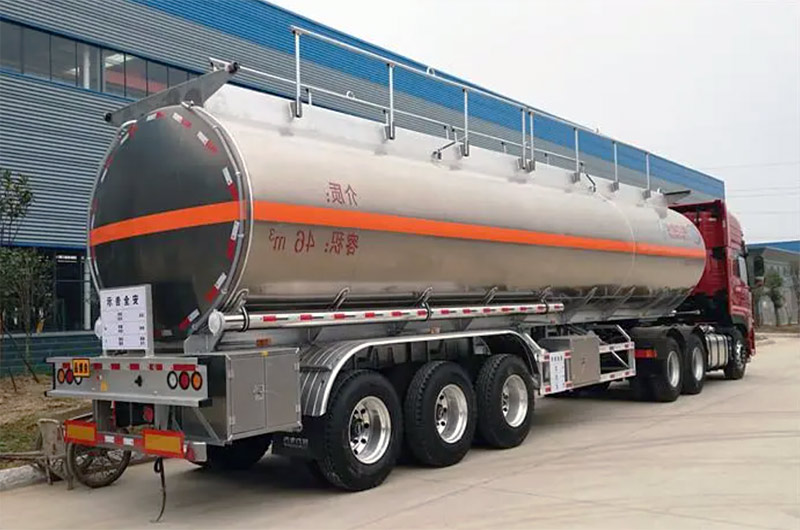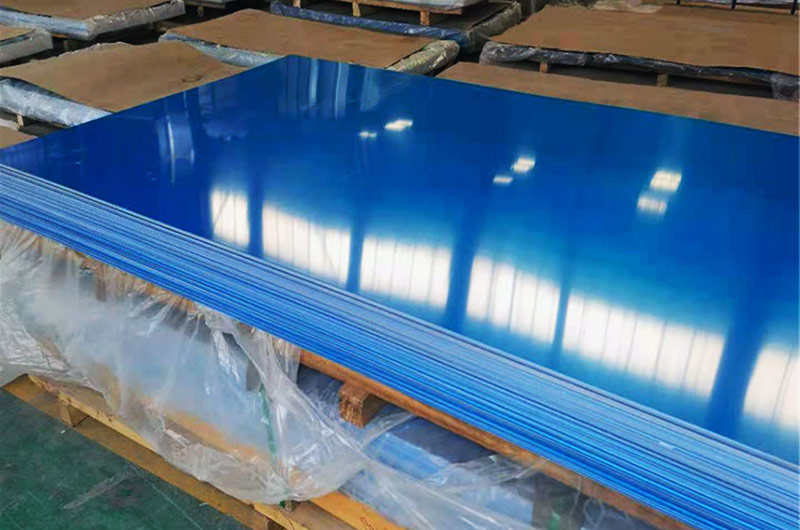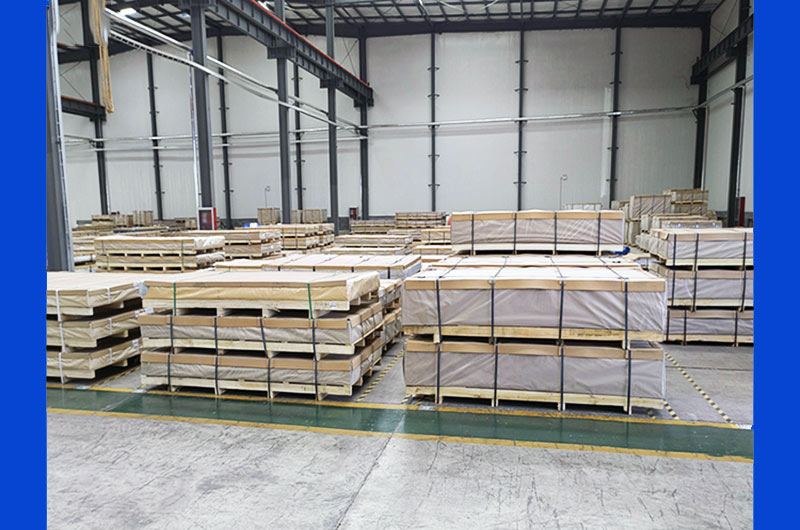5059 Aluminum Plate for Tankers
Safe and leak-free Low temperature resistance
Introduction 5059 Aluminum Plate for Tankers
In the world of transportation and logistics, tankers play a critical role in the safe and efficient transportation of various liquids and gases, ranging from water and chemicals to petroleum and liquefied natural gas (LNG).
The construction of these tankers requires materials that are not only strong and durable but also lightweight to maximize fuel efficiency. 5059 aluminum plate has emerged as a popular choice for manufacturing tankers, thanks to its exceptional properties and versatility.

The alloys of aluminum plates for tank trucks are usually AA5083 and 5059 aluminum plates. The corrosion resistance of 5059 alloy is better than that of 5083 alloy. The Zn content of 5059 alloy is higher, which is beneficial to the corrosion resistance of the alloy. If desired, 5059 aluminum alloy can be strengthened using strain hardening or cold machining processes.
5059 aluminum alloy is an aluminum-magnesium alloy, mainly magnesium alloy. It is not strengthened by heat treatment but becomes stronger by strain hardening or cold machining of the material.
5059 aluminum alloy is a forged alloy type with good corrosion resistance. Because heat treatment does not strongly affect strength, 5059 is easily weldable and retains much of its mechanical strength.
Understanding 5059 Aluminum Plate
What Is 5059 Aluminum Plate?
5059 aluminum palte is an aluminum plate that belongs to the 5xxx series, which is known for its excellent combination of strength and corrosion resistance.
It is primarily composed of aluminum (Al), with magnesium (Mg) and manganese (Mn) as the primary alloying elements. This specific composition gives 5059 aluminum plate its remarkable properties, making it suitable for a wide range of applications, including tanker construction.
The 5059 alloy aluminum plate used for tank trucks has low density and high tensile strength, which is higher than some low carbon steel. It has strong resistance to seawater and marine climate corrosion, and has good welding performance.
5059 is an aluminum alloy with excellent comprehensive properties and is used in ships, yachts, cruise ships, oil tankers and other fields. For Al-Mg series rust-proof aluminum, 5059 has higher strength than 3A21, especially with high fatigue strength. Similar to 3A21, 5059 has high plasticity and corrosion resistance.
5059 aluminum plates/coils are widely used in fuel and other dangerous goods tank trucks. They have high strength, high plasticity and corrosion resistance, good weldability and low crack tendency. With its own unique advantages, it is widely used in special tank trucks for dangerous goods such as petrochemical industry.
Key Properties of 5059 Aluminum Plate
- High Strength: 5059 aluminum plate is known for its high strength, which is crucial for tanker construction. Its tensile strength is typically in the range of 310-385 MPa, making it a robust choice for withstanding the stresses and pressures experienced during transportation.
- Corrosion Resistance: One of the most critical factors in tanker construction is the ability to resist corrosion, especially when transporting aggressive or corrosive liquids. 5059 aluminum plate offers excellent corrosion resistance, thanks to its protective oxide layer.
- Lightweight: Aluminum, in general, is a lightweight material. 5059 aluminum is no exception, and its low density makes it ideal for tankers where weight reduction can lead to significant fuel savings.
- Weldability: Tanker manufacturing often requires complex shapes and structures. 5059 aluminum plate is easily weldable, allowing for efficient fabrication of tanker components.

Common Product Names 5059
5059 is the Aluminum Association’s (AA) designation for this material. In the European standard it will be designated EN AW-5059. A95059 is the UNS number. Additionally, the EN chemical name is AlMg5, 5MnZnZr.
5059 Tanker Aluminum Plate Specifications
- Alloy: 5059
- Thickness: 1.0-500mm
- Width: 20-2650mm
- Length: 500-16000mm
- Standard: ASTM B209, EN573, EN485
- Equivalents of AA 5059: UNS A95059, ISO AlMg5.5MnZnZr, Aluminium 5059, AA5059, Al5059
Characteristics of 5059 Aluminum Plate Coils for Tank Trucks
- 1. Low density, only 2.66g/m³.
- 2. 5059 aluminum has high tensile strength, higher than some low carbon steel.
- 3. Excellent corrosion resistance and durability.
- 4. It has good welding performance and is not easy to crack or deform after processing.
- 5. We use a precision saw with an accuracy of ±1.5mm to ensure the accuracy of the 5059 aluminum plate.
Advantages of 5059 Aluminum Plate in Tanker Manufacturing
1. Safety and Environmental Benefits
Reduced Corrosion Risk: The corrosion-resistant nature of 5059 aluminum plate reduces the risk of leaks or contamination, ensuring the safety of transported liquids and the environment.
Lightweight Design: Using 5059 aluminum plate leads to lighter tankers, which can reduce the overall weight of the vehicle and contribute to better fuel efficiency and lower emissions.
2. Economic Benefits
Longevity: Tankers are a significant investment, and their long-term durability is a crucial factor in their economic viability. 5059 aluminum's resistance to corrosion and wear ensures a longer service life.
Reduced Maintenance Costs: The minimal maintenance requirements of aluminum tankers compared to those made of other materials can lead to significant cost savings over the tanker's lifetime.
3. Environmental Benefits
Recyclability: Aluminum is a highly recyclable material, making it an environmentally friendly choice. Recycling aluminum requires significantly less energy compared to producing it from raw materials, reducing the carbon footprint of tanker manufacturing.
In addition, there are the following advantages
- 1) Petroleum tank truck 5059 aluminum plate has excellent corrosion resistance and durability.
- 2) The 5059 aluminum plate of petroleum tank trucks has good welding performance and is not easy to crack or deform after processing.
- 3) Petroleum tank trucks made of petroleum tank truck 5059 aluminum plates have high recycling value.
5059 Tanker Aluminum Plate Mechanical Performance
The mechanical properties of 5059 vary significantly with hardening degree and temperature.
| Alloy | 5059 | |
| Temper | O/H12/H32 | |
| Yield Strength | Rp0.2(Mpa) | 401 |
| Tensile Strength | Rm(Mpa) | 280 |
| Elongation | A50(50%) | 16.2 |
5059 Tanker Aluminum Plate Chemical Composition
| Chemical Element | Weight (%) |
| Aluminum, Al | 89.8 - 94 |
| Magnesium, Mg | 5-6 |
| Manganese, Mn | 0.60-1.2 |
| Iron, Fe | ≤ 0.50 |
| Silicon, Si | ≤ 0.45 |
| Zinc, Zn | 0.40 - 0.90 |
| Chromium, Cr | ≤ 0.25 |
| Copper, Cu | ≤ 0.25 |
| Titanium, Ti | ≤ 0.20 |
| Zirconium, Zr | 0.050 - 0.25 |
| Other (each) | ≤ 0.050 |
| Other (total) | ≤ 0.15 |
Applications of 5059 Aluminum Plate in Tanker Manufacturing
Why 5059 Aluminum Plate in Tanker Manufacturing?
1. 5059 aluminum plate has high tensile strength, strong resistance to seawater and marine climate corrosion, and good welding performance, so it is widely used in ship construction.
2. Aluminum can truck panels have good electrical conductivity and energy absorption properties. Sparks will not be generated when the tanker collides, thus reducing the occurrence of accidents such as explosions. It is an ideal material for manufacturing various liquid, liquefied gas and powder tank trucks.
The choice of materials in tanker manufacturing is critical, as it directly impacts the efficiency, safety, and overall performance of the tankers. 5059 aluminum plate has gained popularity due to its unique combination of properties, making it a suitable choice for various types of tankers, including:
- Chemical Tankers: Chemical tankers carry a wide range of hazardous and non-hazardous chemicals. The corrosion resistance of 5059 aluminum plate is a significant advantage in this application, as it can withstand the aggressive nature of many chemicals.
- Oil Tankers: Transporting crude oil, petroleum products, and other hydrocarbons requires materials that can withstand the harsh conditions at sea. 5059 aluminum's corrosion resistance and strength are beneficial in this context.
- LNG Tankers: LNG tankers carry liquefied natural gas at extremely low temperatures. The low-temperature toughness of 5059 aluminum plate makes it suitable for these applications.
Structural Components in Tankers
The construction of tankers involves various structural components, each with its specific requirements. 5059 aluminum plate finds application in several critical parts of tankers:
- Tank Walls: The walls of the tanks themselves are often made from 5059 aluminum plate due to its corrosion resistance, ensuring the safety of the transported liquids.
- Tank Bulkheads: Bulkheads inside the tanks need to withstand the pressure and prevent the liquids from sloshing during transportation. The strength of 5059 aluminum is a key advantage here.
- Piping and Tubing: 5059 aluminum is also used for piping and tubing systems within the tankers, ensuring the safe and efficient flow of liquids or gases.

Conclusion
5059 aluminum plate has proven itself as a reliable and versatile material for the construction of tankers. Its high strength, corrosion resistance, lightweight design, and environmental benefits make it a preferred choice in the transportation industry.
As the demand for efficient and sustainable transportation solutions continues to grow, the use of 5059 aluminum plate is likely to become even more widespread in the construction of tankers, contributing to a safer, more cost-effective, and environmentally friendly transportation industry.
Recommended content you might be interested in
-
5182 Aluminum Plate for Tanker
Specifically designed for tankers, our 5182 aluminum plate offers excellent corrosion resistance and high strength for reliable leak and splash protection.
-
5083 Aluminum Plate for Tanker
Our products meet the quality standards and complete specifications, choosing the right Tanker Aluminum Plate will not deteriorate or cause pollution in harsh environments.
-
5454 Aluminum Plate for Tankers
To ensure the safety and reliability of these tankers, the choice of materials is of utmost importance. Among the various materials available, 5454 aluminum plate has emerged as a popular choice due to its exceptional properties and benefits.
-
5754 Aluminum Plate for Tankers
5754 Aluminum Plate for Tankers Its light weight, corrosion resistance, durability and formability make it an ideal material for all types of tankers.

